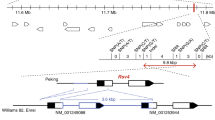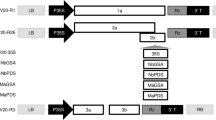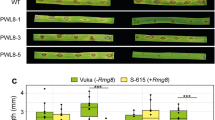Abstract
To reduce crop losses due to geminivirus infection, we targeted the bean yellow dwarf virus (BeYDV) genome for destruction with the CRISPR–Cas (clustered, regularly interspaced short palindromic repeats–CRISPR-associated proteins) system. Transient assays using BeYDV-based replicons revealed that CRISPR–Cas reagents introduced mutations within the viral genome and reduced virus copy number. Transgenic plants expressing CRISPR–Cas reagents and challenged with BeYDV had reduced virus load and symptoms, thereby demonstrating a novel strategy for engineering resistance to geminiviruses.
This is a preview of subscription content, access via your institution
Access options
Subscribe to this journal
Receive 12 digital issues and online access to articles
$119.00 per year
only $9.92 per issue
Buy this article
- Purchase on Springer Link
- Instant access to full article PDF
Prices may be subject to local taxes which are calculated during checkout


Similar content being viewed by others
References
Mansoor, S., Zafar, Y. & Briddon, R. W. Geminivirus disease complexes: the threat is spreading. Trends Plant Sci. 11, 209–212 (2006).
Hanley-Bowdoin, L., Bejarano, E. R., Robertson, D. & Mansoor, S. Geminiviruses: masters at redirecting and reprogramming plant processes. Nature Rev. Microbiol. 11, 777–788 (2013).
Pilartz, M. & Jeske, H. Abutilon mosaic geminivirus double-stranded DNA is packed into minichromosomes. Virology 189, 800–802 (1992).
Aragao, F. J. L. & Faria, J. C. First transgenic geminivirus-resistant plant in the field. Nature Biotechnol. 27, 1086–1088 (2009).
Yang, C.-F. et al. Generation of marker-free transgenic plants concurrently resistant to a DNA geminivirus and a RNA tospovirus. Sci. Rep. 4, 5717 (2014).
Westra, E. R., Buckling, A. & Fineran, P. C. CRISPR-Cas systems: beyond adaptive immunity. Nature Rev. Microbiol. 12, 317–326 (2014).
Halley-Stott, R. P., Tanzer, F., Martin, D. P. & Rybicki, E. P. The complete nucleotide sequence of a mild strain of Bean yellow dwarf virus. Arch. Virol. 152, 1237–1240 (2007).
Li, J.-F. et al. Multiplex and homologous recombination-mediated genome editing in Arabidopsis and Nicotiana benthamiana using guide RNA and Cas9. Nature Biotechnol. 31, 688–691 (2013).
Stenger, D. C., Revington, G. N., Stevenson, M. C. & Bisaro, D. M. Replicational release of geminivirus genomes from tandemly repeated copies: evidence for rolling-circle replication of a plant viral DNA. Proc. Natl Acad. Sci. USA 88, 8029–8033 (1991).
Qi, L. S. et al. Repurposing CRISPR as an RNA-guided platform for sequence-specific control of gene expression. Cell 152, 1173–1183 (2013).
Bolger, A. M., Lohse, M. & Usadel, B. Trimmomatic: a flexible trimmer for Illumina sequence data. Bioinformatics 30, 2114–2120 (2014).
Kearse, M. et al. Geneious Basic: An integrated and extendable 531 desktop software platform for the organization and analysis of sequence data. Bioinformatics 28, 1647–1649 (2012).
Quinlan, A. R. & Hall, I. M. BEDTools: a flexible suite of utilities for comparing genomic features. Bioinformatics 26, 841–842 (2010).
Baltes, N. J., Gil-Humanes, J., Cermak, T., Atkins, P. A. & Voytas, D. F. DNA replicons for plant genome engineering. Plant Cell 26, 151–163 (2014).
Liu, D. et al. Validation of reference genes for gene expression studies in virus-infected Nicotiana benthamiana using quantitative real-time PCR. PLoS ONE 7, e46451 (2012).
Acknowledgements
We thank K. Leffler for the help in generating the figures. We thank J. Gil for technical assistance with the qPCR experiment. This work was supported by a grant from the National Science Foundation (IOS-1339209).
Author information
Authors and Affiliations
Contributions
N.J.B. and A.W.H. designed the experiments, with input from D.F.V. N.J.B, A.W.H. and E.K. generated constructs. N.J.B., A.W.H. and E.K. performed the transient assays. E.K. provided technical support. R.C. analysed the NGS data. A.N.B. and D.M.B. helped design the infection experiments; E.K. and A.B. performed the experiments. N.J.B., A.W.H. and D.F.V. wrote the paper. D.F.V. supervised the entire project. All authors read and approved the final manuscript.
Corresponding author
Ethics declarations
Competing interests
N.J.B., A.W.H. and D.F.V. are inventors on a patent application (WO2015048707A2) for the technology described in this work.
Supplementary information
Rights and permissions
About this article
Cite this article
Baltes, N., Hummel, A., Konecna, E. et al. Conferring resistance to geminiviruses with the CRISPR–Cas prokaryotic immune system. Nature Plants 1, 15145 (2015). https://doi.org/10.1038/nplants.2015.145
Received:
Accepted:
Published:
DOI: https://doi.org/10.1038/nplants.2015.145
This article is cited by
-
Strategies to improve genome editing efficiency in crop plants
Journal of Plant Biochemistry and Biotechnology (2023)
-
Towards developing resistance to chickpea chlorotic dwarf virus through CRISPR/Cas9-mediated gene editing using multiplexed gRNAs
Journal of Plant Diseases and Protection (2023)
-
Current trends in management of bacterial pathogens infecting plants
Antonie van Leeuwenhoek (2023)
-
CRISPR/Cas-Mediated Genome Editing Approach for Improving Virus Resistance in Sugarcane
Sugar Tech (2023)



